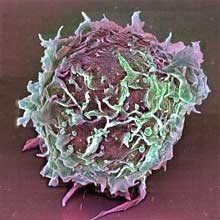Rebooting the Immune System of Diabetics
A combination of stem cells derived from patients’ blood and immunosuppression to eliminate a faulty immune system can help keep newly diagnosed diabetics off insulin, according to a preliminary study published today. The findings, which still need to be verified in larger groups, are part of a growing effort to use immunotherapy to halt the progress of Type 1 diabetes.

“This is a therapy designed to stop the disease process so a person’s native cells remain intact,” says Jay Skylar, director of the Division of Endocrinology, Diabetes & Metabolism at the University of Miami, who wrote an editorial accompanying the paper, published today in the Journal of the American Medical Association.
Type 1 diabetes is an autoimmune disease in which the immune system attacks insulin-producing cells, known as beta cells, in the pancreas. When someone is first diagnosed with the disease, he or she still has some functioning beta cells, so scientists want to find ways to stop further destruction.
Previous studies of antibodies that block destructive immune cells have shown success for a limited period of time. The new study, which combines immunotherapy and stem-cell transplants, seems to improve beta-cell function. The combination therapy has previously been used in other autoimmune disorders, such as lupus, but this is the first trial that tests it in diabetes.
In the study, carried out by researchers at the University of Sao Paulo, in Brazil, and Northwestern University, in Chicago, patients newly diagnosed with Type 1 diabetes had stem cells harvested from their blood. They then underwent a form of chemotherapy to get rid of islet-killing immune cells. Following an injection of their own purified stem cells, they were monitored for insulin dependence and beta-cell function.
Thirteen of the fifteen patients given the treatment were able to stop taking insulin for a period ranging from nine months to three years. “These patients have been free of any medication after the procedure,” says Richard Burt, an immunologist at Northwestern University and an author of the study.
Experts caution that the results are preliminary and must be followed up with more-rigorous studies. “It was an uncontrolled study with a small number of people and short duration of follow-up,” says Skylar, who adds that he’d like to see people followed for two years or more. “Still, I think it’s promising. It seems to be able to be done without side effects and is therefore worth proceeding.”
While it’s not exactly clear how the treatment works, the researchers hypothesize that it essentially reboots the immune system by favoring the production of regulatory cells, which keep the immune system in check, over the immune cells that attack beta cells. “We kill the immune system and rebuild it with stem cells from the patient,” says Julio Voltarelli, a physician and researcher at the University of Sao Paulo, who led the research. “We can see after transplant that the immune system is now healthy.”
This type of treatment would only be effective in newly diagnosed diabetics, who still have some beta-cell function left to preserve. For patients with more-advanced forms of the disease, scientists are working on cell transplants to replace lost islet cells, using cells from donor organs and, eventually, from embryonic stem cells.
Keep Reading
Most Popular
Large language models can do jaw-dropping things. But nobody knows exactly why.
And that's a problem. Figuring it out is one of the biggest scientific puzzles of our time and a crucial step towards controlling more powerful future models.
The problem with plug-in hybrids? Their drivers.
Plug-in hybrids are often sold as a transition to EVs, but new data from Europe shows we’re still underestimating the emissions they produce.
Google DeepMind’s new generative model makes Super Mario–like games from scratch
Genie learns how to control games by watching hours and hours of video. It could help train next-gen robots too.
How scientists traced a mysterious covid case back to six toilets
When wastewater surveillance turns into a hunt for a single infected individual, the ethics get tricky.
Stay connected
Get the latest updates from
MIT Technology Review
Discover special offers, top stories, upcoming events, and more.